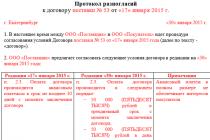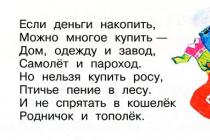From September 1, 2014 owners of premises in MKD have the right to unite in TSN (FZ No. 99 of 05/05/2014). At its core, a partnership of real estate owners (TSN) is a transformed form of HOA, which now cannot be registered in any way. In this article, we will talk about what TSN is, what are its functions, powers, rights and obligations.
MKD control methods
What is TSN
As an organizational and legal form, TSN is a partnership. According to the law, TSN is a voluntary association of owners of real estate, in our case, premises in an MKD. TSN is created for joint possession, use and, within the limits established by law, the disposal of common property (clause 1 of article 123.12 of the Civil Code of the Russian Federation).
TSN is a non-profit corporate organization created to meet the needs of MKD owners. Members of the partnership have the right to participate in it, form its supreme body, have rights and obligations in relation to the legal entity they have created (clauses 1, 2, article 65.1 of the Civil Code of the Russian Federation). Creation and activity TSN regulated by Articles 123.12 - 123.14, Articles 65.1 - 65.3 of the Civil Code of the Russian Federation and the norms of Section VI of the Civil Code of the Russian Federation.
The partnership provides maintenance, operation and repair of the common property of the owners in the house. TSN can also lease out parts of common property in MKD by decision of the general meeting of owners (parts 1 - 2 of article 152 of the RF LC).
TSN can conduct business MKD management activities. But this type of activity should serve only those goals for which the TSN was created. The income received should not be appropriated and distributed among its members (Article 218, 123.13 of the Civil Code of the Russian Federation). TSN is independently responsible for its obligations with its property. Members of the TSN are exempted from liability for the debts of the partnership (clause 3 of article 123.12 of the Civil Code of the Russian Federation).
The partnership is created without limitation of the period of activity. But it is possible to create a TSN for a certain period, which must be spelled out in its charter.
Charter of TSN
The charter of the TSN submitted for state registration must comply with the norms of the Civil and Housing Codes. According to clause 2 of article 123.12 of the Civil Code of the Russian Federation, the charter of a TSN must contain the words " association of property owners". Also, the following information must be indicated in the document:
- location;
- the subject and goals of the partnership;
- composition and competence of TSN bodies;
- decision-making procedure, including issues, decisions on which are taken unanimously or by a majority of votes.
Charter of TSN adopted at a general meeting of owners of premises in an MKD by a majority vote of the total number of voters (part 2 of article 135 of the LC RF). The decision of the OSS is considered adopted if the majority of the meeting participants voted for it in the presence of a quorum (clause 1, article 181.2 of the Civil Code of the Russian Federation). The decision of the meeting may be taken by absentee voting.
TSN is considered created after its state registration (Federal Law No. 129 of 08.08.2001 "On State Registration of Legal Entities and Individual Entrepreneurs"). At state registration, TSN are presented minutes of the general meeting of owners of premises in MKD with the decision made on the issue of creating a partnership (part 5 of article 136 of the LC RF).
The provided OSS protocol should also contain the following information:
- on approval of the charter of TSN;
- about the persons who voted at the general meeting of owners of premises in the MKD for the creation of a partnership;
- on the shares belonging to the voters in the right of common ownership of non-residential premises in the MKD.
Also attached partnership charter. TSN must have a seal with its name, a bank account, and other details.
Membership in TSN
Members and founders of TSN can be owners of residential and non-residential premises in the house. Also, members of the partnership can be legal entities that own the above-mentioned objects of common use on the basis of ownership, economic management or operational management.
Membership in TSN arises from the owner on the basis of a written application for joining the partnership (parts 1 - 5 of article 143 of the LC RF). If a partnership has already been established in an MKD, then persons who have bought apartments or rooms in this building can also become members of the TSN on the basis of ownership of the premises.
Membership in TSN is terminated after filing an application for withdrawal from the partnership or from the moment of termination of ownership of the premises in the MKD.
In TSN must be entered register of partnership members. The register must contain information about all members of the TSN, the size of their shares in the common ownership of non-residential premises in the house. A member of the TSN must provide reliable information about himself and notify the board of the partnership in time about their change.
Rights and obligations
To conduct the work of the partnership, to implement the decisions taken by the general meeting, a chairman is elected in TSN and a board is created (clause 2 of article 123.14 of the Civil Code).
The duties of the board of TSN include (Article 148 of the RF LC):
- control over the timely payment by TSN members of the mandatory payments and contributions accepted by the OSS;
- drawing up estimates of income and expenses for the year, reports on financial activities, submitting them to the OSS for approval;
- MKD management, conclusion of contracts for the management of MKD;
- hiring employees to service MKD, their dismissal;
- conclusion of contracts for maintenance, operation and repair of common property in MKD;
- maintaining a register of members of the partnership, office work, accounting and financial reporting;
- convening and holding a general meeting of members of the partnership.
In TSN, management and control bodies can be created. The supreme governing body in TSN is the general meeting of its members (clause 1, article 65.3, article 123.14 of the Civil Code of the Russian Federation). According to paragraph 2 of article 65.3 of the Civil Code of the Russian Federation, the competence of this body includes:
- determination of the direction of activity of TSN, the principles of formation and use of common property;
- approval and amendment of the charter of the partnership;
- determining the procedure for admission and exclusion of members of the TSN;
- formation of TSN bodies and early resignation of their powers;
- approval of annual, accounting and financial reports of TSN;
- making decisions about creation of TSN, its participation in other legal entities, the creation of branches and the opening of representative offices;
- making decisions on the reorganization and liquidation of TSN, appointment of a liquidation commission, approval of the liquidation balance sheet;
- election of the audit commission, appointment of an audit organization or an individual auditor;
- making decisions on establishing the amount of mandatory payments and contributions of TSN members (clause 1 of article 123.14 of the Civil Code of the Russian Federation);
- making decisions on the alienation, leasing, repair, pledge or transfer of other rights to the property of the TSN to third parties; obtaining borrowed funds, bank loans; determination of the purposes of using income from economic activity of TSN (Article 145 of the RF LC).
That's all we wanted to talk about association of property owners in today's article.
5/5 (5)
Concepts
An apartment building is a small state that needs to be managed. For this, the UK, HOA, TSN, housing and communal services or housing and communal services are elected. It all depends on who the tenants trust to manage their property.
To clarify the information, it is necessary to decipher such concepts as HOA and TSN. Indeed, on the one hand, these are just letters, the meaning of which is not known to many.
HOA refers to a homeowners association. The partnership is a community aimed at solving housing-related issues.
All participants are stakeholders. The owner is the owner of property that belongs to him by right, which can be documented. Housing refers to property intended for permanent residence.
Combining the concepts, we get a definition: an association of homeowners is an association of apartment owners in one apartment building, whose activities are not commercial and are aimed at solving common issues.
Moreover, it is important to note that in this case the decisive factor is the word “apartment”, since by housing we mean a room intended for permanent residence.
The duties of the HOA include:
- common property management;
- ensuring the uninterrupted supply of public services;
- improvement of territories;
- solution of public issues related to the management of the house.
The HOA is a non-profit association, therefore its purpose is not to make a profit.
Attention! The main legal act regulating relations between tenants and HOAs is the Housing Code of the Russian Federation. Here are the main provisions that enable the owners to manage the house.
In general, the Housing Code of the Russian Federation provides for several types of property management for owners of apartment buildings.
They are listed in Article 161 of the LC RF:
- conducting economic life by the owners themselves, without the involvement of third-party organizations (such management is welcome when the house is small, no more than eight families live in it);
- homeownership management through the HOA (in this case, a chairman is elected who will be responsible for resolving public issues);
- A housing cooperative is rarely created, but it has the opportunity to exist in Russia;
- often the conduct of business life is transferred to the Management Company (in this case, the owners are required to pay a certain amount aimed at paying for the services of the management company).
Each species is significantly different from each other. The difference, first of all, lies in the method of management and income generation. If the management company charges money for its services, then the HOA does not have the right to do so.
In any case, homeowners are the main stewards. It is on the basis of a common decision that amendments are made to the contract, issues are considered. The rules for holding the meeting are reflected in Article 161 of the Housing Code of the Russian Federation.
The activities of the HOA cannot be recognized as commercial, as it is aimed at solving general issues. The rule is regulated by Article 50 of the Civil Code of the Russian Federation and Article 135 of the Housing Code of the Russian Federation.
The abbreviation TSN stands for Association of Property Owners. Let's try to expand this concept. A partnership is an association aimed at solving social issues. More often than not, partnerships do not generate income.
Owners are the owners of property that belongs to them according to existing documents. Real estate is a type of property, which is a premise for any purpose.
Thus, a complete definition can be drawn up: a partnership of real estate owners is an association aimed at solving public issues related to the management of property owned by several owners.
At the same time, it is important to pay attention to the fact that not only apartments, but also other real estate are taken into account.
Important! In general, management is aimed at the following types of property:
- several private houses, for example, a small settlement;
- garages (often a co-op is used, but TSN may exist);
- warehouse (it is necessary to create a TSN if there are warehouses belonging to several owners on the same territory);
- land (land plots can also be managed and disposed of, for example, in the conduct of general agricultural activities);
- gardening, summer cottages (property is similar to land plots, but real estate located on the land is taken into account in parallel);
- trading platforms (conducting business activities in relation to several sites intended for trading activities, owned by several owners);
- other property that can be classified as real estate.
The activities of TSN are aimed at conducting economic activities in relation to any real estate. Participants do not receive profit. Their interests are the same.
The main difference between HOA and TSN is the type of property, which is included in the list of management activities. If in the second case the partnership is in charge of all types of property, then the HOA is aimed at managing only apartment buildings, that is, premises intended for permanent residence.
Attention! Our qualified lawyers will assist you free of charge and around the clock on any issues.
What is the difference between HOA and TSN
Homeowners Association and Real Estate Owners Association are similar concepts, but have significant differences. Both in the first and in the second case, the activities of organizations are not aimed at making a profit. But their goal is the successful management of the property of the owners.
The main differences between HOA and TSN include:
- type of property. If under the HOA only residential premises fall under management, then in the second case, the organization operates in relation to all real estate owned by the owners, for example, private houses and adjacent courtyard buildings, including a garage area;
- HOA participants can only be individuals, when enterprises can also organize TSN. This is useful when multiple organizations are collaborating. However, firms cannot profit from the creation of TSN;
- The goals of HOA and TSN are slightly different from each other. The activities of the HOA are aimed at servicing the common property and its maintenance. TSN not only tries to preserve and ensure a decent physical appearance of the property, but also disposes of it. For example, TSN leases premises, issues permits for the construction of buildings on land, may order the sale of territories, and so on;
- Undoubtedly, the name of the charter of the organization will change. After all, in fact, partnerships are of a different nature. Some paragraphs of the document are significantly different;
- type of control. When organizing an HOA, the owners become the main managers. Decisions are made on the basis of a general decision by voting. When TSN are created: a management body, a control body, an executive department.
Previously, the difference between TSN and HOA was the ability to choose a simplified taxation system. The right belonged exclusively to the HOA. But in 2015, thanks to the Letter of the Ministry of Finance of the Russian Federation N 03-11-03/2/14958 of March 19, 2015, and N 03-11-03/2/14938 of March 19, 2015
TSN: pros and cons
The owners themselves decide what to choose, TSN aphids HOA. Each type of management has its pros and cons.
Please note! The benefits of a homeowners association include:
- if the owner - a legal entity or an individual does not have the opportunity to timely resolve issues related to property management, it is possible to elect TSN, which will deal with solving problems instead of the owner of the property. Therefore, the advantage of TSN is time saving;
- with TSN, management is carried out exclusively by a certain circle of people. It is impossible to meet service violations, and if they are found, it is easy to find the guilty person;
- making a profit is not the goal of TSN, so owners can count on favorable business conduct. All funds contributed will be used to ensure the safety and increase of property;
- TSN activity is open. Participants can review the documentation at any time.
However, TSN has not only advantages, but also disadvantages. When making decisions, the opinion of the majority is not taken into account. The decision is made by the governing body. No one can influence the final decision. TSN will be able to declare itself bankrupt at any time, while no one will return the funds of the owners aimed at conducting activities.
The main difference, which, on the one hand, is an advantage, and on the other, a disadvantage, is obtaining a license. The rule is regulated by Article 192 of the Housing Code of the Russian Federation.
Advantages and disadvantages of HOA
The creation of a homeowners association has many advantages, which, first of all, are:
- the possibility of solving issues of improvement of the common territory, maintenance of the house;
- the opportunity to take part in solving certain issues (they are taken on the basis of the opinion of residents by voting);
- the activities of the HOA are fully open, any owner has the opportunity to request accounting, tax and other financial documents;
- introduction of a simplified taxation system, which is associated with a reduction in management costs;
- ease of organizing a homeowners association, no need to go through licensing.
However, in addition to the advantages of the HOA, it has its drawbacks.
Remember! These include:
- the minority of proprietors is obliged to submit to the decision of the majority;
- it is necessary to pay membership fees, some do not always understand what they are going for.
Thus, the advantages of creating an HOA are greater than the disadvantages. In any case, you will need to pay a certain amount intended for conducting business activities when choosing any managing organization. And if the tenant does not agree with something, he can always initiate an extraordinary meeting at which to bring up an exciting issue for discussion.
HOA is a bit like TSN, but has significant differences. TSN is a legal entity, and HOA is a society of civilians. When deciding on the creation of a particular form, you will need to carefully consider all aspects of each concept.
Watch the video. HOA - pros and cons:
Main goals and objectives

The goals, tasks of the HOA and TSN practically coincide. HOA is created to conduct business activities. However, when organizing TSN, the association is engaged not only in the maintenance of property, but also in its disposal, for example, renting, leasing, selling, and so on.
Both HOA and TSN have the right to charge owners a fee aimed at maintaining the property. Otherwise, there will be no funds to ensure the functioning of the company.
The activities of the HOA and TSN are regulated by the internal charter.
Thus, several conclusions can be drawn:
- the goal of the HOA is the ability to ensure the safety of property. The task of the HOA is to conduct economic activities;
- the purpose of TSN is the formation of a fund, ensuring the safety of property and its multiplication. The task of TSN is the conduct of economic activities and the operation of property.
All owners of an apartment building become members of the HOA. TSN is a legal entity and may become bankrupt.
Transformation Law
In 2014, changes were made to the Housing Code of the Russian Federation.
Attention! Now the HOA is re-qualified as a TSN if:
- activity is ongoing;
- there are many participants;
- it is supposed to collect funds from the tenants for the maintenance of the house.
This changes the legal form. That is, if the HOA is an association of individuals, then TSN is one legal entity.
In 2015, when creating a TSN, it is mandatory to obtain a license to carry out activities.
During the conversion changes:
- charter. The legal form is changing and, as a result, some aspects of the document;
- circle of rights and obligations. Homeowners are relieved of the obligation to attend meetings and vote for decisions.
In order to correctly determine the method of ownership and management of common property: HOA, TSN or ZHSK, it is necessary to study the norms of modern legislation. It provides answers to many controversial questions. It is necessary to clearly understand the differences between these organizational legal forms, their parity, to name the best aspects and similarities.
What is a partnership of real estate owners: rights and obligations, legislation
TSN is referred to as a partnership of property owners. Persons established by the charter can join it. It involves the association of persons with the whole triad of powers for the joint possession, use and management of their real estate. This organization is abbreviated as TSN.
This cooperative has both its rights and obligations. Since this is a non-profit association, they do not have the right to engage in profit-making activities. They can only hold general meetings, decide the agenda, issue internal local legal acts.
This organization is obliged to observe the rights and legitimate interests of the participants in the partnership, carry out management activities, make decisions on the conclusion of contracts with third-party organizations, etc.
This organization has the right to manage property on the basis of internal local legal acts.
The main legislative regulation is carried out by such regulatory legal acts as:
- The Constitution of the Russian Federation.
- Housing Code of the Russian Federation.
- Civil Code of the Russian Federation, etc.
Separate provisions can be enshrined in presidential decrees and government decrees. It is possible to rename TSN to HOA. At the same time, the work of this organization will not change.
What is HOA
HOA as an abbreviation stands for a partnership of homeowners. This is a non-profit organization that is created to manage residential premises in an apartment building.
This is one of the forms of common property management on a par with, for example, a management company. This is a legal entity, the procedure for the creation of which is regulated by civil law. In order to create an HOA, it is necessary to hold a general meeting of tenants, which must be fixed in writing. Otherwise, the registration authority will not approve the creation of this legal entity. faces.
The difference between the UK and the HOA is that the first is a professional commercial firm, and the second is a non-profit association. She does not have the right to engage in business. She may rent property and otherwise make a small profit and spend it only on the needs of this non-profit association.
The main differences between the HOA and the UK:
What is JSK
A housing construction cooperative is understood as a housing cooperative. This is the official definition of the term. The legislation has established that it is not a commercial company engaged in the joint management of consumer resources. A cooperative is created with the aim of pooling the financial resources of citizens for the construction of houses, summer cottages, etc. All citizens participate in this association by making a share contribution. Ownership of the building will arise only in the situation when the share is fully paid.
Subsequently, this office can be transformed into a TSN or an HOA. This happens at the request of the owners by holding a general meeting and registering a new legal entity to replace the existing one.
Consumer cooperative in comparison with TSN and HOA
One of the forms of association of citizens is a consumer cooperative. The purpose of creating this legal persons - satisfaction of the material or everyday needs of citizens on the basis of the contributions they have made.
This organization is not commercial, which means that the founders have no profit-making goals. By and large, TSN and HOA are varieties of a consumer cooperative.
Depending on how responsibility is distributed and what kind of property citizens own and use, a consumer cooperative can be created in various forms. For example, apartment buildings can serve as an example. They mainly create HOAs, which can be deciphered as a partnership of owners of residential premises.
In the event that the purpose of creating a legal entity is the ownership and management of lands, garages, cottages, etc., it is recommended to create TSN - a partnership of property owners.
What is the difference between an HOA and a TSN and a housing cooperative: which is better, pros and cons, a comparative table
Previously, it was already indicated what HOA and TSN are. We can make an unambiguous conclusion that these are two varieties of the same form of non-profit associations - consumer cooperatives. The housing construction cooperative differs significantly from them.
This is legal. a person whose purpose of creation is not the possession and management of common property, but the creation of such property, in this case - residential apartment buildings.
For a more specific clarification of this issue, a comparative table can be given and the pros and cons of each of these formations can be identified:
| Characteristic | homeowners association | Association of property owners | Housing building society |
| Form of education | Entity | Entity | Jur. face |
| Purpose of creation | Non-Commercial Interests | Non-Commercial Interests | Commercial interests |
| Activities | Ownership and management of residential premises | Ownership and management of land and immovable objects | Creation of new objects of legal relations - apartment buildings |
| Investments of persons | They may or may not be | Funds are brought in to contribute to the construction |
Thus, despite the differences between these organizations provided for by law in Russia, they are largely similar.
Disclosure of information by HOA and housing cooperative
It should be noted that in 2019, the legislator paid great attention to checking the activities of organizations managing apartment buildings. This is important in order to respect the rights and legitimate interests of citizens.
Under the new legislation, issues in the field of housing and communal services should be taken into account in the reporting documentation of authorized organizations. Accounting includes not only the summing up of financial reports, but also the identification of work carried out in the house, contracts concluded.
Citizens who are members of one of the management organizations have the full right to receive all reliable information about the activities of the HOA or housing cooperative. This is realized through access to documentation, the right to request references and reports on activities for the week, month, year.
In a situation where the rights of a citizen who is a member of an HOA or a housing cooperative are violated, he has the right to withdraw from this legal entity, get back his share (if any) and demand full compensation for losses in a judicial or claim procedure. In the presence of a large number of complaints about this jur. person, it can be liquidated by force.
Association of property owners and taxation
Taxation is transferred to a lighter form, in which a legal entity is exempted from paying certain mandatory contributions. Since the association of property owners is a non-profit partnership, they do not pay most of the taxes that commercial associations must pay (for example, corporate income tax).
This does not mean that TSN pays practically no taxes. Civil law allows this organization to carry out other useful activities, in addition to owning and managing common property, for example:
- Collection and acceptance of share and entrance fees of members of the organization.
- Collecting money for ongoing repairs or capital construction (reconstruction) of the building.
- Other fees, including when using the common property of tenants for profit.
All these financial receipts must be properly declared. This is done by an accountant. Based on such declarations, the amount of tax contributions of the association of property owners will be calculated.
What happens if you register at the same time HOA and TSN
The fundamental acts regulating the creation and activities of HOA and TSN are the Civil Code of the Russian Federation and the Housing Code of the Russian Federation. It should be noted that both laws consider homeowners associations as one of the varieties of TSN.
In the event that the registration authority carries out the procedure for registering an HOA in place of the existing TSN, then one of these organizations, if this omission is revealed, will be deleted.
Often, even before the moment of registration, Rosreestr officials identify the facts of double registration and stop it.
Thus, it was determined how the types of consumer cooperatives differ from themselves, how to register them, etc. You can find out the advantages and disadvantages of each of these forms with a detailed study of the norms of modern legislation.
The Association of Real Estate Owners is a relatively new form of non-profit organization.
It differs in organizational and legal status and is created to unite property owners of various types.
What is TSN, what laws regulate it and how this form of organization differs, you will find out after reading the article.
Article 123 of the Civil Code defines an association of property owners.
 According to it, TSN is an association of real estate owners who, on a voluntary basis, create a partnership to organize joint ownership, use and disposal of real estate. It can solve other tasks that do not violate the law.
According to it, TSN is an association of real estate owners who, on a voluntary basis, create a partnership to organize joint ownership, use and disposal of real estate. It can solve other tasks that do not violate the law.
In this form, it is not only easier to keep records of real estate objects, but also to manage them. For example, tenants who own apartments in an apartment building create TSN to regulate cleanliness and order inside the house (light on the floors, elevator operation, etc.) and in the area around it. Their goal is to provide comfortable living conditions.
This association is a legal entity whose members own the same type of real estate.
Partnership unites the owners of any real estate:
- Premises (both residential and non-residential) in one building (or several).
- residential or country houses.
- Summer cottages.
- Gardens or orchards.
Legislative regulation of the issue
The changes in the Civil Code that took place in 2014 affected almost all owners (and not just legal entities), although the law does not oblige to undergo a re-registration procedure.
TSN is regulated on the basis of the general legal framework relating to real estate.
Among legislative acts relating to this type of organization, there are:
- Civil Code of the Russian Federation - articles 49, 65, 123, 174, 181,182 and 218.
- LC RF - articles 135, 136, 143, 145, 149, 150, 152 and 161.
By the way, since 2014, there have been changes in the legislation, according to which SNT (horticultural non-profit partnerships) and (homeowners associations) are now created in the form of TSN. 
Functions, tasks and goals of the organization
Functions in TSN distributed as follows:

the main task such an association is the organization of the collective use of real estate. Thanks to the association of real estate owners, owners can manage independently without involving third-party organizations (for example,).
Rights and obligations
The legal capacity of the association of property owners is enshrined in the main document - the charter of the organization.
This form of legal person has a specific separate property, which, if necessary, will be used to meet the obligations assumed.
So members are not responsible for the actions of the organization:
- No subsidiaries.
- Not in solidarity.
- Neither share.
The partnership takes over duty for the formation of control and management bodies created for the coordination and decision-making of its members and other legal entities (for example, for construction work or connection to the housing and communal services network). The main governing body of the association must decide on the establishment of mandatory contributions for members of the organization.
TSN can do business and receive income from this (according to the Civil Code of the Russian Federation), but under two conditions:
- This activity must meet the goals of the association (enshrined in the charter).
- Profits cannot be distributed among the members of the organization.
All actions of the organization must meet its goals and objectives. At the association there are rights:

If the participants do not fulfill their obligations, enshrined in the charter or the decision of the meeting, the partnership may try in court to force them to fulfill their obligations, make payments or contributions. Also, the organization may, in a judicial proceeding, demand compensation from the violators for the damages caused, which were formed due to the failure of the members to fulfill their obligations.
TNS obliged:
- Conduct its activities within the framework of the norms established in the legislation, as well as in accordance with its charter.
- Enter into contracts with third parties to perform specific work.
- Fulfill the obligations assumed and monitor the sanitary and technical condition of the common property.
The owner becomes a member of TSN after he submits an application for admission there. You can withdraw from the partnership by submitting an application for withdrawal from it.
Him members have the right:
- Ask TSN for information about its activities.
- Participate in the activities of the association independently or by sending a trustee there (select and become a candidate for managerial positions, make proposals for improving the quality of work).
- If they do not agree with the decision of the governing bodies, they can appeal it in court.
- Familiarize yourself with the main documents of the organization.
- Demand from TSN the proper quality of services and work that they are required to carry out in accordance with the charter.
Registration procedure
AT charter union you need to specify it:

TSN members (and at the same time its founders) can be:
- Phys. persons who are owners of real estate designated as an object of common use.
- Legal entities that have the right to own, manage and manage the property of the partnership.
By joining the organization and filling out an application, the person who wishes indicates information about himself in it. Later, this information will be entered into the register so that it can be established exactly what kind of real estate (share) belongs to this member. If any changes have occurred with real estate or personal data has changed, the TSN participant will have to notify the board of the organization about this.
There are no strict and clearly defined requirements for the charter of a partnership in the legislation. The main thing is that its provisions do not violate the norms of the Housing and Civil Codes.
The advantages and disadvantages of such a combination
Advantages associations of property owners in the following:

Flaws associations are:
- It is not a universal organization with a legal status that will solve any problem. A lot depends on the type of property. Not all owners should join. For example, if the partnership consists of owners of emergency housing or residents of a building requiring major repairs, they are unlikely to be able to raise the necessary amount in time.
- The risk of bankruptcy of the association is high. In this case, the owners will not be able to return their funds and contributions.
- TSN must obtain a license to conduct activities indicated in the charter. This will take additional time, effort and money.
Distinctive features
This association of owners different from HOA the following features:

See the following video about the advantages of organizing this type of association of real estate owners:














